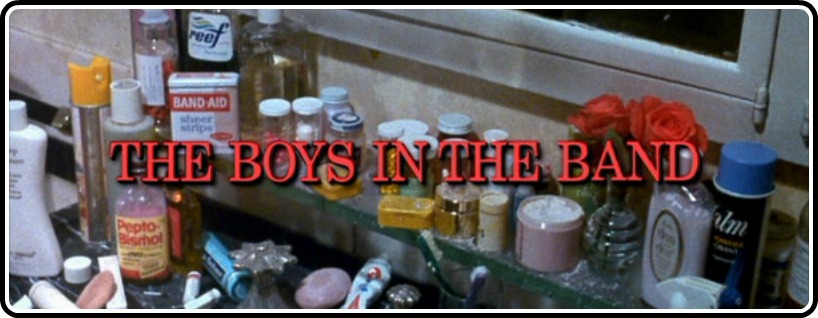Arriving on the stage during a watershed period in time for the gay rights movement, very few plays have been as socially impactful with regards to that movement as Mart Crowley’s breathtaking look at a group of gay men known as The Boys In The Band. Hitting theaters with strength in 1968, the play debuted off Broadway with director Robert Moore in toe, and stunned the nation, which a year later would see the Stonewall riots solidify a movement as one that will not be stop. And it’s still being fought today, even in the highest courts of this very nation.
And while the play itself may very well be brilliant (I myself can’t say that I’ve seen it), what I can say is that if its half as breathtaking as the cinematic adaptation from director William Friedkin, it’s truly a masterwork of theater.
Friedkin’s film, released two years following the debut of the play, stars a bevy of talented thespians and features a script penned by Crowley, and is as fantastic an intimate drama as the director has ever crafted.
Set one night in New York’s Upper East Side, we meet Michael and Donald, in the midst of preparing for a birthday party to be held in the honor of their friend, Harold. As the guests arrive, we begin to slowly learn the dynamics of this collective, ranging from the alleged ring-leader/alcoholic Michael to the flamboyantly in your face Emory, all the way to the pair of lovers Larry and Hank, who themselves have their own demons to try and heal. However, when a friend from Michael’s past throws himself back into his life, only to arrive at the party, the dynamics change, and everyone’s true colors are fleshed out.
It’s in this drama that the film truly thrives. While he’d go on to helm other theater adaptations, very few have had as brazen a sense of true-blue drama as this film. Inherently a picture about the interpersonal relationships of our leads, each of them bring their own level of truth, without feeling over bearing. Every single character not only gets their moment in the film’s spotlight, but they themselves find their interactions to be the most emotionally devastating beats within this picture. As cinematically muted a picture as you’ll find in Friedkin’s canon, the picture’s central focus is in the study of these characters. Set during a time where being openly gay was not a fond ideal, each character has a sense of self-loathing that is absolutely devastating, and the way it manifests itself in the singular characters and their interactions even more so.
And yes, while the picture is relatively muted cinematically, this is far from a weak picture directorially. Friedkin’s camera allows itself to leave breathing room for each dramatic beat, or to linger on faces or objects for just the right length of time to bring with it the strongest emotional impact. Featuring gorgeous photography from Arthur J. Ornitz (who has done such films as Serpico and Death Wish), the film is full of energy and vitality, in everything ranging from its use of setting to Friedkin’s use of light in some sequences (there is a storm that plays heavily into the film’s drama). Toss in the occasional zoom and pan, and you have a drama that is akin to a filmed play, but not without everything that makes cinema the devastatingly emotional art form that it truly is.
But again, it’s all about the performances. Kenneth Nelson spearheads the cast as the self-loathing Michael, who comes off as cocksure to those he comes into contact with, but those who know him see that he’s got his demons. He and Harold (played by the fantastic Leonard Frey) are the leaders of the group, or so it appears as their relationship is not only the most tense, but there appears to be the most history. He is living with Fredrick Combs’ Donald character and they invite over the likes of Hank and Larry, the lovers with commitment issues played by Laurence Luckinbill and Keith Prentice respectively, and even a local trick, Cowboy Tex, played by Robert La Tourneaux. With a script that feels as speedy and off the cuff as a film noir, the film is layered and full of tonally dense and vital interchanges between people with more than just years of history between themselves.
What’s just as interesting however, is where this picture stands within Friedkin’s body of work. Released a year prior to The French Connection and three prior to The Exorcist, this stands as a truly inspired bit of dramatic filmmaking. Without the inherent action spatially as the former and with a completely different style of tension than the latter, the picture feels like an early experiment for a director unwilling to stay in one cinematic place at once. With his picture Sorcerer often bantered about as a hopeful Criterion release, hopes for that film have been squashed, so why not take on an even earlier, and arguably just as thrilling, a picture as we’ve seen from Friedkin.
Arguably one of Friedkin’s most underrated pictures, if not his very most, The Boys In The Band is a thrilling drama that is as great a motion picture as it is an important film within the history of cinema, and particularly what has become known as the queer cinema movement. With a 2011 documentary about the play, its creator and the film still in need of a massive release (entitled Making The Boys) and Friedkin out and about in promote on of a new memoir, this could be a stacked, and truly important, release for The Criterion Collection. Here’s to hoping.



